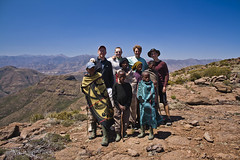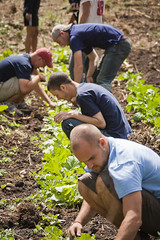October 16
In a society with no Facebook, YouTube,  Call of Duty or The Bachelor, it should be no surprise that good conversations will flourish. This past week was no exception to that rule as I found myself growing closer to my peers and my Savior. The whole group had gathered on a farm; hard work and good times were sure to follow, and some great conversations were bound to come our way.
Call of Duty or The Bachelor, it should be no surprise that good conversations will flourish. This past week was no exception to that rule as I found myself growing closer to my peers and my Savior. The whole group had gathered on a farm; hard work and good times were sure to follow, and some great conversations were bound to come our way.
My first conversation was with a young man who worked on the farm. He had a lot of questions about what it meant to attend a Christian university. Truthfully, I was a bit embarrassed to tell him I was only required to attend one class that was focused on the Bible. Later when he found that I wanted to be a missionary he expressed some frustrations with many missionaries who don’t seem to be willing to work in the really difficult and dangerous places of the world. Perhaps God was speaking to me through this young man, only time will tell.
 Later on in the week the conversations continued to both intrigue and challenge me. Conversations from non-violence to grace to Islam to politics all bounced up and despite varying opinions, they all seemed to bring the group closer together.
Later on in the week the conversations continued to both intrigue and challenge me. Conversations from non-violence to grace to Islam to politics all bounced up and despite varying opinions, they all seemed to bring the group closer together.
Perhaps some of you who are reading this back home should challenge yourselves to a few hours, maybe even a day or two with no electricity. You might be surprised to see what you will learn about yourself and your friends. At the very least, take the time to re-evaluate who and what really matters to you. You might be surprised by what you find out.
– Francis Sims
This past week, our group left our homes in Malealea, and went to live and work on a small farm about three hours away. We took a 22 passenger bus, all 33 of us plus our luggage packed in tight, from Malealea to Mohalis Hoek. We then divided into two smaller taxis that took us  through the bumpy paths of the mountains while listening to “House” music bumping at full volume the entire way.
through the bumpy paths of the mountains while listening to “House” music bumping at full volume the entire way.
The farm, an old mission house over 100 years old, is run by a small group of workers trying to farm in a way that works better the with land they have. Of the biggest problems for farmers in Lesotho is soil erosion, and with it the loss of much of their crops. In order for this to be avoided the less disturbed the soil is the better. And for this reason, all the labor is done by hand. No machinery is used for fear of disturbing and loosening the soil too much. Their goal is to make enough yields to be sent out and to show farmers of the area the benefits of their methods.
During the week we spent our mornings helping out with a variety of projects on the farm. We helped in setting up irrigation lines, digging holes for planting, building compost piles, seeding, and creating water lines. The afternoons were  then free for us to do as we pleased. There were several trips made to the river after lunch for a swim and partial bathing, some hikes and soccer games with the local team, but most of all a lot of rest in whatever shade we could find. The farm was littered with groupings of large lilac trees that perfumed the grounds. Many of my afternoons were spent under them reading, drifting in and out of little naps, and waking up to an early sunset making everything golden and warm.
then free for us to do as we pleased. There were several trips made to the river after lunch for a swim and partial bathing, some hikes and soccer games with the local team, but most of all a lot of rest in whatever shade we could find. The farm was littered with groupings of large lilac trees that perfumed the grounds. Many of my afternoons were spent under them reading, drifting in and out of little naps, and waking up to an early sunset making everything golden and warm.
I have to admit that our time there was the perfect break from our stay in Malealea. I was happy to step back from our home stays for awhile. For me it was perfect timing to catch up mentally from an unexpected overwhelming first week in my home. It gave me the energy to come back and pick up where I left off as I had time to realize what I had missed.
– Hannah Miller